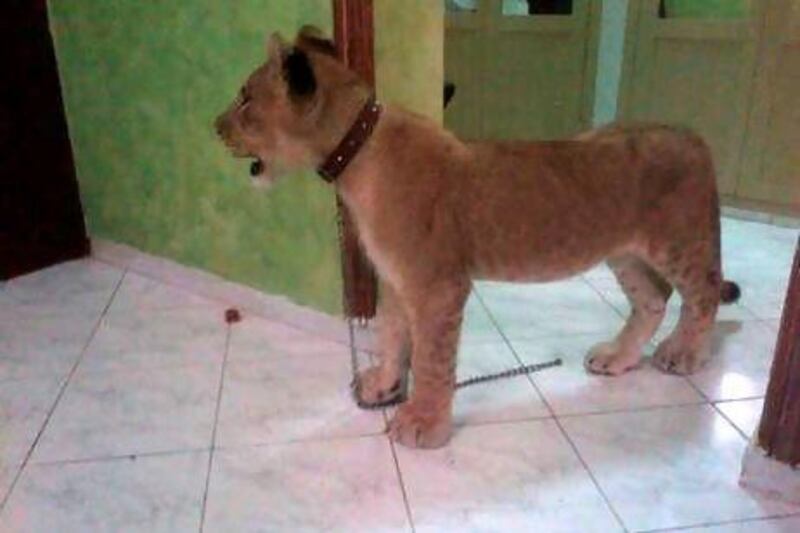ABU DHABI // A six-month-old lion cub put up for sale on the social media website Twitter on Monday set off a miniature bidding frenzy, as more than 100 interested buyers offered at least Dh30,000 for the wild animal.
Photos of the cub wearing a collar and lead were posted on the Twitter account for PetMateUAE, a Dubai-based online pet store "selling all types of pets in the UAE".
Tweets that have since been deleted said the animal was "available for those who are interested" and the Dh30,000 price tag was "to make sure you can afford it".
The Emirati owner and operator of the pet store, who did not wish to be identified, said the lion was not his and he was only trying to find a suitable home for the cub, not sell it.
"Obviously, if I was going to sell a lion, I would never tweet it to the whole world," he said.
In later tweets, the pet store owner pleaded for help in finding a private farm for the lion cub. He said the cub was purchased by a friend at the animal market in Sharjah. The owner also said he would ensure the cub would only go to a caretaker with the proper permits and licences.
The store owner said an official from the Ministry of Environment and Water, the agency responsible for animal welfare in the emirates, had taken custody of the lion today.
The trade in animals online has rocketed in the region in recent years, said Dr Elsayed Mohammed, the Middle East director for the International Fund for Animal Welfare.
In just the past five days, Dr Mohammed said he had noted on the internet more than 100 cases of exotic or endangered animals available in the UAE.
"I have seen a remarkable increase in the advertisements for wildlife or wild dangerous animals on the internet," he said. "These are dangerous animals, and they belong in the wild and should not be kept as exotic pets."
The International Fund for Animals is compiling a report on online trading in endangered animals and will present it to the Ministry of Environment and Water after two weeks of monitoring websites.
Dr Mohammed said he has seen pythons, tigers, lions, cheetahs and monkeys for sale since he began his research last week.
Trading exotic or wild animals is not necessarily illegal in the UAE and is regulated by an international treaty called the Convention on International Trade on Endangered Species of Wild Flora and Fauna (Cites).
The UAE is a signatory to the convention, and a 2002 federal law on international trade of endangered species includes the Cites agreement.
Most African lions are listed as an Appendix II species, meaning their trade is controlled but not forbidden.
Dr Mohammed, who was a member of the UAE's national Cites team, said the most commonly imported lion would require several permits, including an export permit from its country of origin and approval from the ministry. Without proper permits, buying or selling the animals is illegal.
"As far as we know, the ministry is not providing permits to private individuals for dangerous animals," Dr Mohammed said.
Reem Al Thawadi, a spokesman for the Emirates Wildlife Society -World Wildlife Fund said the non-profit group was working with the Environment Agency -Abu Dhabi to trace the lion cub's origins.
"We need to know where they are coming from and if they are coming in illegally," Ms Al Thawadi said.
Mostly Asiatic lions are listed as Appendix I species and cannot legally be bought or sold, unless the animal was born as part of an approved captive-breeding programme.
Wildlife experts also said anyone who has information on illegal wildlife trafficking or suspicious wildlife trade should contact the Ministry of Environment and Water's Cites unit.





